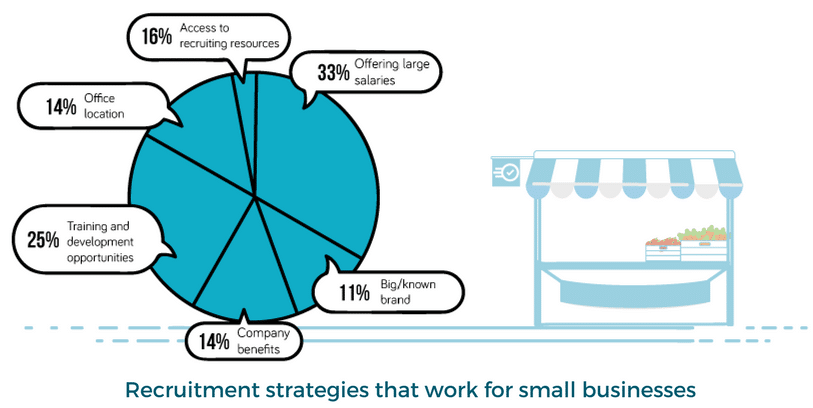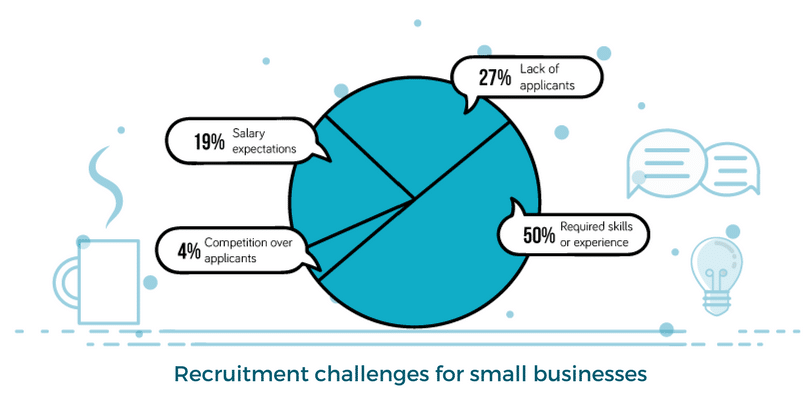By Dave Clough
Results from the latest survey by Forde HR Cloud show that as many as two out of three business managers and CEOs may struggle when recruiting new staff. While some hiring hurdles are shared across all business sizes and industries, SMEs face particular challenges when it comes to luring talent:
- Applicant lack of skills and experience (50%)
- Lack of applicants (27%)
- Challenging salary expectations (19%)
Applicants Lack of Skills or Experience
Finding candidates who have relevant past experience and can hit the ground running is a wide-spread issue for many organisations. However, it has particular challenges for SMEs who, unlike bigger corporations, often can’t afford the time and financial investment to train new hires from the ground up.
Lack of Applicants
This is one recruitment hurdle that seems to affect SMEs more so than bigger companies. It can be the result of a lack of vacancy advertising, a lack of applicant motivation to apply, or a mix of both. Small businesses usually have some of the best working environments and company cultures because of their small, family-like nature, however, they have to work harder to publicise themselves as competitive employers.
Challenging Salary Expectations
Here, again, small businesses can feel disadvantaged by their inability to compete with the big compensation packages on offer by industry giants. Often SMEs see successfully interviewed candidates turn down their job offers because they’re unwilling to accept the salary, or they can’t keep talent because staff find better wages elsewhere.
So, what are the best solutions to a challenging landscape?
The answer to overcoming many of these recruitment obstacles can be found in those small businesses who said they don’t struggle. More importantly, why they feel their recruitment strategies are successful:

Big Salaries
33% of SMEs believe the most successful recruitment strategy for them is to place an emphasis on larger salaries. That may seem obvious, but it isn’t practical for all growing businesses who don’t have the large wage budgets that industry leaders do.
The pros of advertising big salary packages are obvious; you will attract the top talent to your business. The cons, however, are many – and not just because its expensive. Large salaries can cause resentment among small, tight-knit teams where there are big disparities in pay. They can also raise questions among clients as to the pricing structure of your products/services. Then there is the problem with increases, and if you can’t afford future pay rises, how do you keep employees motivated? Employing those motivated almost entirely by salary will harder to retain in the long run.
There are alternative compensatory methods, however. Some small businesses will offer a share of equity, so that key staff members have a real invested stake in growing the business successfully. Others will work on a bonus structure or commission in the early days.
However, there are other non-financial benefits packages which prospective job candidates can find just as tempting as cold hard cash.
Training and Development
The second most fruitful recruitment strategy for small businesses comes in the form of offering training and development opportunities. This is particularly noteworthy in light of the fact that “lack of skilled applicants” is proving such as issue.
If you can’t recruit them, train them.
Research suggests that employees want more training. If a potential new staff member can see that you value your team enough to invest in their development then that will be a major selling point for your business. Possibly even more than a high salary offering, short term. In fact, of all the non-financial motivators, opportunities for career growth are the most valued. In 2016, 68% of employees rated training and development as the most important policy their employer has.
This can play in an SME’s favour. Small businesses are often seen as specialists and their team working is less linear than the silo departments of bigger organisations. Marketing the diversity of the role and the opportunity to gain experience across a range of disciplines could help to attract ambitious applicants, hungry for development. Supporting the progression of ambitious staff will result in them feeling professionally satisfied and less inclined to leave.
Recruiting Resources
16% of small businesses surveyed then stated that “access to recruiting resources” like third party agencies and head hunters helped them succeed in recruiting talent. This tactic can certainly help to bring more applicants who are more qualified, with less effort which could be viewed as a time-saving exercise. However, you get what you pay for and these services come at a substantial cost.
There are many resources that SMEs can utilise to promote job vacancies without paying substantially to do so. The company website should be the first port of call. With the job ad on the site, it is entirely possible to optimse the listing so it appears in Google. You could also run a small, locally targeted PPC (pay per click) campaign to attract local job hunters.
Free recruitment sites like Indeed are a popular choice, as are local or industry jobs boards.
Social media platforms offer a great range of tactics to take advantage of. Firstly, there’s LinkedIn’s Job listings and the ability to keyword-search for candidates and head-hunt. Meanwhile, 67% of recently employed people found their role through Facebook. Setting up a job ad is relatively easy and there’s a range of audience targeting options so your spend isn’t wasted. Finally, you can use Twitter hashtags like #JobFairy to promote the vacancy.
SMEs can even contact local universities, further education centres and independent training consultants in their industry who may be able to point them towards particularly talented graduates or individuals who are seeking a change.

Company Benefits
As noted earlier, salaries are far from the only benefit potential applicants want to see from a prospective employer and SMEs are uniquely placed to offer some of the more enticing perks for modern workers.
Thanks to modern IT infrastructures, it is easier than ever to accommodate flexible and remote working. Other ways to promote a positive company culture include little gestures like birthday days off, “pizza Fridays” or quirky wellbeing stunts like office yoga. Not forgetting, ping-pong tables and ball pits!
Working closely with the surrounding community also comes naturally to small businesses. This allows them to offer partnership perks such as charity days paid leave so staff can give back to a cause close to their heart, or enjoy free membership at a local gym to improve their health, especially if the job is computer-based.
For those still seeking more tangible “perks”, new services like Perkbox are gaining popularity among SMEs as a cost-effective way to give something tangible to employees in the form of discounts, freebies and competitions.
Final Shout
In terms of recruiting, being a small business shouldn’t be seen as a weakness to overcome. It’s a strength that should be marketed with passion. An individual has the ability to make a huge impact right away and be seen doing so. To many, this is an exciting, attractive proposition. Therefore, when pitched right, it is entirely possible to appeal to and retain the top talent in an industry.
If there are any gaps in your recruitment strategies, try address as many as possible before ploughing time and resources into promoting the next vacancy. There’s so much you can do that will benefit, not just the hiring process, but your existing teams and the retaining of.
This article was produced in collaboration with Jerome Forde, a HR and employee relations specialist with almost 30 years’ senior-level experience in complex public, private and not-for-profit organisations. Jerome founded FordeCloud, a HRIT platform that uses the most advanced cloud technology to bring a virtual HR office to start-ups and SMEs.


